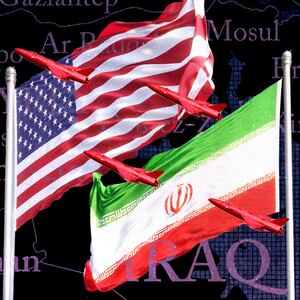Iran reportedly seized on Thursday an oil tanker at the center of a dispute with the United States, as tensions continue to soar over Iranian proxy attacks on American and other vessels in the Middle East.
Four or five armed men “wearing military style black uniforms with black masks” jumped aboard the vessel, the St. Nicholas, and carried out the capture just east of Sohar, Oman, according to an alert issued by the U.K. Marine Trade Operations Thursday. “Unknown voices” were heard over the phone along with the captain’s, the report stated.
The hijackers ordered the vessel to reroute towards Iranian territorial waters, at which point communications were lost with the tanker, according to the alert.
Iran’s Navy seized the vessel in retaliation for the United States’ previous actions against the oil tanker, according to the Islamic Republic News Agency.
The United States last year resolved a dispute over the oil tanker loading Iranian-sanctioned crude oil in 2022. The oil tanker, then known as the Suez Rajan, ultimately forfeited the crude to the United States.
Iran was “retaliating” for what it saw as “theft” of its oil at the time, according to Iranian state news.
The United States called on Tehran Thursday to “immediately release” the crew and the ship.
“We condemn the Iranian seizure of the St. Nicholas,” State Department Deputy Spokesperson Vedant Patel told reporters Thursday. “The Iranian government must immediately release the ship and its crew. This unlawful seizure of a commercial vessel is just the latest behavior by Iran, or enabled by Iran, aimed at disrupting international commerce.”
“Iran, and Iranian enabled provocative actions like this, are a menace to the global economy and it must cease,” Patel added.
The latest tussle over vessels in the Middle East coincides with heightened tensions over Iranian proxy attacks on U.S. and other vessels in the Red Sea, which is located across the Arabian Peninsula from the Gulf of Oman. The Houthis, Iranian-backed proxies, have carried out over two dozen attacks and seized a vessel since Israel began attacking Gaza in response to the Hamas Oct. 7 attack.
The Houthis have said that they will not stop unless Israel ends its attacks against Hamas.
Since the start of the year, the Houthis have continued to disrupt shipping in the Red Sea, prompting warnings from the United States that there will be consequences.
On Thursday, the Houthis launched an anti-ship ballistic missile from Houthi-controlled areas of Yemen into international shipping lanes in the Gulf of Aden, according to an alert from U.S. Central Command.
On Tuesday, the U.S. and British navies—including the USS Dwight D. Eisenhower, USS Gravely, USS Laboon, USS Mason, and the British ship HMS Diamond—responded to a series of missile and drone attacks launched from Houthi-controlled areas of Yemen towards the Red Sea, where dozens of merchant vessels were operating, according to U.S. Central Command.
On Wednesday, U.S. Secretary of State Tony Blinken warned of impending consequences for the continued attacks, without divulging details about what they may look like.
“We’ve made clear, we’ve been clear with more than 20 other countries that if it continues, as it did yesterday, there will be consequences,” Blinken told reporters in Bahrain.
British Defense Secretary Grant Shapps issued a similar statement that this could not remain the status quo.
“This is an unsustainable situation,” Shapps said, Reuters reported. “This cannot continue and cannot be allowed to continue.”







